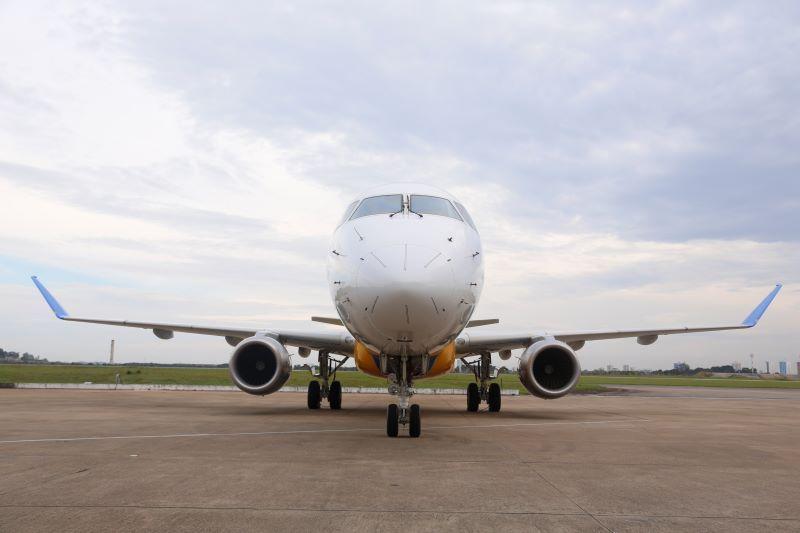
Delays in suppliers providing engines, avionics and interiors continue to hamper Embraer, forcing the Brazilian aerospace and defense leader to miss delivering dozens of aircraft so far in 2022, and the company does not expect to see supply chain normalization until maybe past 2023.
“We are getting parts but with a lot of delays, and then we have to try to change a lot of our production schedule during the past month to accommodate the production with the delays,” Embraer CEO and President Francisco Gomes Neto told an analyst teleconference Nov. 14. “We see delays being reduced during the second half of next year, but still not at a normal situation. I think this situation will normalize completely only in 2024. But again, we are prepared with our production plan to live with this situation in 2024.”
CFO Antonio Carlos Garcia said the company has missed delivering 10 aircraft from each of its commercial and executive business units so far in 2022, and risks missing another 3-4 each due to the supplier constraints. Still, Embraer is working hard to catch up and complete as many of the sidelined deliveries as possible before the end of the year, he added.
The executives further stressed that, overall, the company should remain with its previously provided financial guidance for the whole year, albeit at the low end. “Even with this tough situation with the supply chain, we continue affirming that we will be within the guidance,” Neto said. “The reason for this is because we were more conservative in the beginning of the year announcing the guidance.”
The company expects sales of at least $4.5 billion, with commercial jet deliveries of 60-70 and executive jets of 100-110. The company’s firm order backlog value reached almost $18 billion, the highest point since the beginning of the coronavirus pandemic. Furthermore, the managers raised their guidance for generating total free cash flow this year to at least $150 million, up about $100 million.
Still, revenue for the latest third quarter was $929 million, down 3% from the year before, much of which was due to a falloff in revenue at Embraer’s defense and security unit. Adjusted net loss was $30 million over just $10 million in the same third-quarter period last year. The associated loss per share grew to $0.16 from $0.05.
Nevertheless, Embraer sees brighter prospects ahead in the near term for both the baseline E-Jet E1 and advanced E2 families—the latter boosted by the recent Civil Aviation Administration of China (CAAC) approval of a type certificate covering the E190-E2.
Describing the CAAC green light as “great and promising news,” Neto says the milestone “opens the door of a relevant market for the E2 family.” Although the current E2 order book contains a firm order in the region for just 10 aircraft from the China-based ICBC bank, Embraer believes the certification clearance will stimulate additional sales in China’s regional and inter-regional market sectors. The company also hopes the move potentially will compensate for lapsed contracts such as a batch of 20 E190-E2s ordered in 2014 by Tianjin Airlines, which no longer appears in the backlog.
Embraer Commercial Aviation President and CEO Arjan Meijer says, “We’re very pleased we got the certification over the line very recently. We are actively working in the Chinese market, so that is progressing.” The reason the company has high hopes for the E190-E2, and the follow-on E195-E2—which is due for CAAC certification next—is because “those fall very nicely between the [Comac] ARJ21, which is the smaller Chinese jet product, and the C919,” he adds.
The uptick in prospects for regional aviation growth in China also follows CAAC certification of the Franco-Italian ATR42-600 turboprop on Nov. 8.
Commenting on additional commercial business from the last quarter, Neto also noted the addition of a firm order for 20 E195-E2s from Ontario-based Porter Airlines, bringing the Canadian carrier’s commitment to 50 orders and 50 options. “We also announced the expansion of our presence to the Middle East with a new operator SalamAir which ordered six E195-E2s. On the [passenger-to-freighter] project, P2F, we signed a firm order for up to 10 aircraft with NAC [Nordic Aviation Capital],” he adds.
The agreement with NAC was formalized in October, having been initially announced in May. The first two conversions are destined for Kenya-based Astral Aviation, with deliveries starting in 2024.




